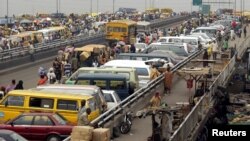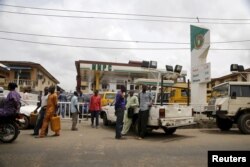After months of wrangling between the president and lawmakers, Nigeria finally has a federal budget. The spending plan has long been viewed as an avenue for theft of public funds in Nigeria.
It is called the “Budget of Change.” The $30.4 billion budget signed earlier this month includes money for roads, railways, bridges and social services. President Muhammadu Buhari said he hopes it will restore Nigerians’ faith in the ability of lawmakers to spend tax money wisely.
The budget received mixed reviews from analysts. Some see it as a step forward for responsible spending in Africa’s largest economy.
Natural Resource Governance Institute Nigeria country officer Dauda Garuba said previous budgets were crammed with kickbacks to lawmakers and ill-scrutinized proposals.
He said months of negotiations between the national assembly and the president was a sign this budget is different.
“The bulk of the fights you were maybe hearing was an attempt by people to say, 'No, we can not do this business as usual' and others saying that, 'OK, if you can not do this business as usual, we have to do our thorough jobs,” said Garuba.
But others say the budget includes money for graft-prone projects and over-the-top spending on lawmakers.
The co-founder of BudgIT, a public spending watchdog group, Oluseun Onigbinde, criticized the allocations of $500 million to so-called “constituency projects,” which are meant to benefit the districts of certain lawmakers.
“It has nothing that has to do with core help for the people or maybe things that are sustainable. It is just them picking loyalist to political party members and giving them what they feel they want to pass along,” said Onigbinde.
On the verge of recession
Nigeria is on the verge of entering a recession, partially the result of the global drop in the price of Nigeria’s top commodity, oil. A series of attacks by militants on oil pipelines has dropped production by more than 500,000 barrels, further harming the economy.
Inflation has risen to almost 14 percent, while the government recently raised fuel prices by nearly 67 percent.
A senior program officer with the Center for Democracy and Development, Yusuf Shamsudeen, faulted the budget for spending $577 million on the national assembly in this economic climate.
“This huge amount can be cut down to provide developmental projects to the citizens and address our economic problems.”
Shamsudeen said the next step in evaluating the budget will be to see if the money allocated actually goes to the projects and programs it is supposed to.





